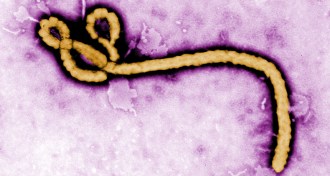Humans
Sign up for our newsletter
We summarize the week's scientific breakthroughs every Thursday.
-
 Health & Medicine
Health & MedicineRemoving both breasts may not boost cancer survival
Women diagnosed with cancer in one breast who choose to have both breasts removed may not have better survival rates than women who opt for breast-conserving surgery and radiation.
-
 Health & Medicine
Health & MedicineRabies races up nerve cells
By hijacking a transporter protein and hitting the gas, the disease-causing rabies virus races up long nerve cells that stretch through the body, a new study finds.
By Meghan Rosen -
 Health & Medicine
Health & MedicineTiny mites are probably crawling all over your face
Two skin mites, relatives of spiders, might populate the faces of all adult humans, according to a DNA survey.
By Nsikan Akpan -
 Life
LifeZMapp drug fully protects monkeys against Ebola virus
In a test, 18 monkeys injected with the Ebola virus and treated with an experimental drug called ZMapp survived.
By Nathan Seppa -
 Health & Medicine
Health & MedicineBabies may be good at remembering, and forgetting
Studies in kids suggest that young children can form memories but can’t recall them later, offering new clues to how memory-storing systems form in young brains.
-
 Genetics
GeneticsEbola genome clarifies origins of West African outbreak
Genetic analyses suggest that a single infected person sparked the ongoing Ebola epidemic in West Africa.
-
 Anthropology
AnthropologySiberians came to North American Arctic in two waves
Siberian ancestors of the modern-day Inuit replaced a 4,000-year-old North American Arctic culture, a DNA study reveals.
By Bruce Bower -
 Health & Medicine
Health & MedicineHuman tests of experimental Ebola vaccine set to start
NIH and NIAID have announced that human tests of an experimental vaccine against Ebola virus will begin in early September.
By Nathan Seppa -
 Health & Medicine
Health & MedicineTo grow new knee cartilage, look to the nose
Cartilage-making cells from the nose grew into patches that successfully replaced damaged or missing cartilage in the knees of goats and of humans.
By Nathan Seppa -
 Psychology
PsychologyWalking in sync makes enemies seem less scary
Men who walk in sync may begin to think of their enemies as weaker and smaller, a new study suggests.
-
 Chemistry
ChemistryLiquid salts break through armored bacteria on skin
Compounds called ionic liquids can penetrate bacterial biofilms on skin to deliver antibiotics to potentially life-threatening infections.
By Sam Lemonick -
 Health & Medicine
Health & MedicineStates’ pot laws linked to drug overdose death rates
Death rates from drug overdoses appear to be lower in states with medical marijuana laws.